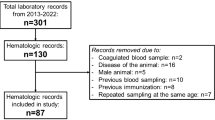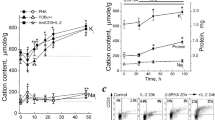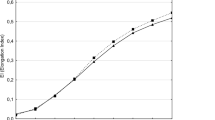Abstract
DURING preliminary experiments on the electrolyte balance of adrenalectomized Scottish Blackface ewes, it became apparent that the concentrations of potassium and sodium in the red blood cells in this breed were not constant. Further examination revealed that they fell into two distinct groups in phenotypically similar animals.
This is a preview of subscription content, access via your institution
Access options
Subscribe to this journal
Receive 51 print issues and online access
$199.00 per year
only $3.90 per issue
Buy this article
- Purchase on Springer Link
- Instant access to full article PDF
Prices may be subject to local taxes which are calculated during checkout
Similar content being viewed by others
References
Denton, D. A., Wynn, V., McDonald, I. R., and Shirley, Simon, Acta Medica Scand., 140, supp. 261 (1951).
Kerr, S. E., J. Biol. Chem., 117, 227 (1937).
Widdas, W. F., J. Physiol., 125 (1954).
Author information
Authors and Affiliations
Rights and permissions
About this article
Cite this article
EVANS, J. Electrolyte Concentrations in Red Blood Cells of British Breeds of Sheep. Nature 174, 931–932 (1954). https://doi.org/10.1038/174931a0
Issue Date:
DOI: https://doi.org/10.1038/174931a0
This article is cited by
-
Novel SNPs in HSP70A1A gene and the association of polymorphisms with thermo tolerance traits and tissue specific expression in Chinese Holstein cattle
Molecular Biology Reports (2011)
-
Red blood cell glycolysis and potassium type in sheep
Experientia (1977)
-
Biochemical polymorphism and the 2,3-diphosphoglycerate in the sheep red blood cells
Experientia (1977)
Comments
By submitting a comment you agree to abide by our Terms and Community Guidelines. If you find something abusive or that does not comply with our terms or guidelines please flag it as inappropriate.



